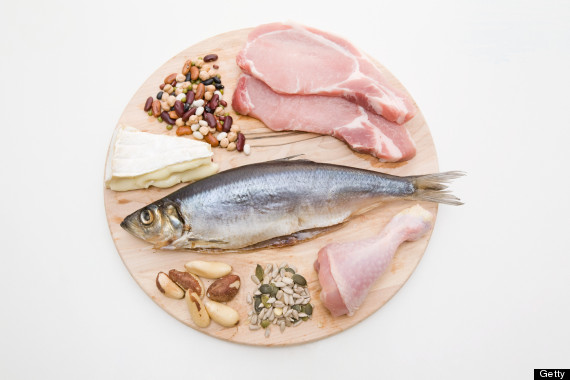If you're struggling to lose weight or unable to suppress hunger pangs, it might be due to a lack of protein in your diet.
According to researchers at the University of Sydney, human's appetite for protein is so strong (and instinctive) that people will continue to eat until they get a sufficient amount of it.
As a result, authors conclude, this lack can cause over-eating and obesity.
"We found that regardless of your age or body mass index, your appetite for protein is so strong that you will keep eating until you get enough protein, which could mean eating much more than you should," said lead study author Dr Alison Gosby.

Protein is crucial to the body's make-up. It helps build bones, muscles, skin, and blood, as well creating enzymes, hormones, and vitamins.
The food found in modern diets are tend to be higher in carbohydrates and fats with lower protein, say experts. This means that in order to reach optimum protein intake, people can find themselves over-eating carbs and fats.
Most people do eat the right amount of protein, the authors explain, just eat too much to get it.
"It has been shown numerous times that eating more protein is a good way to be satisfied from food," says Sam Feltham, HuffPost UK blogger, personal trainer and founder of Smash The Fat.
"Although natural fat is just if not more satisfying, but then there is a massive contradiction in conventional advice of limiting meat consumption, the best source for a full profile of proteins."
According to Sam, eating meat - particularly organ meat, "which has even more vitamins and minerals than regular muscle meat" - is the best way to increase protein intake.
Of course, it isn't the only way. Here are some great meat-free foods that are high in protein, to make sure you get enough of what you need.
According to researchers at the University of Sydney, human's appetite for protein is so strong (and instinctive) that people will continue to eat until they get a sufficient amount of it.
As a result, authors conclude, this lack can cause over-eating and obesity.
"We found that regardless of your age or body mass index, your appetite for protein is so strong that you will keep eating until you get enough protein, which could mean eating much more than you should," said lead study author Dr Alison Gosby.

Protein is crucial to the body's make-up. It helps build bones, muscles, skin, and blood, as well creating enzymes, hormones, and vitamins.
The food found in modern diets are tend to be higher in carbohydrates and fats with lower protein, say experts. This means that in order to reach optimum protein intake, people can find themselves over-eating carbs and fats.
Most people do eat the right amount of protein, the authors explain, just eat too much to get it.
"It has been shown numerous times that eating more protein is a good way to be satisfied from food," says Sam Feltham, HuffPost UK blogger, personal trainer and founder of Smash The Fat.
"Although natural fat is just if not more satisfying, but then there is a massive contradiction in conventional advice of limiting meat consumption, the best source for a full profile of proteins."
According to Sam, eating meat - particularly organ meat, "which has even more vitamins and minerals than regular muscle meat" - is the best way to increase protein intake.
Of course, it isn't the only way. Here are some great meat-free foods that are high in protein, to make sure you get enough of what you need.